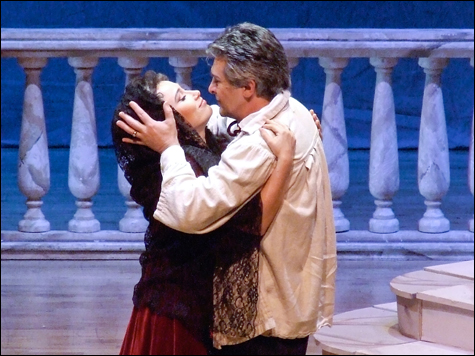The BSO, Handel and Haydn, Pro Arte Chamber Orchestra, the Cantata Singers, David Daniels, and Teatro Lirico d’Europa’s Tosca
By LLOYD SCHWARTZ | January 23, 2008

TOSCA: Nothing boring or passionless about this Tosca and Scarpia, or the Teatro Lirico production. |
Classical music in 2008 Boston did not get off to a brilliant start. Rafael Frühbeck de Burgos led the Boston Symphony Orchestra in two uninspired programs, the first with two over-familiar Richard Strauss tone poems (Don Juan, Till Eulenspiegel) and the even more familiar Ravel orchestration of Mussorgsky’s Pictures at an Exhibition, the second with Norwegian soloist Leif Ove Andsnes in the Rachmaninov Second Piano Concerto (“Full Moon and Empty Arms”) and yet another Strauss tone poem, the Alpensinfonie, glamorously orchestrated but endless Hi Def travelogue music. (The sun rises; we go up the mountain; we get to the top; a storm comes; we go back down; it gets dark.) Andsnes may be too refined a player to go up against Rachmaninov’s deep, dark, throbbing violins. (The BSO’s were luscious.) But his understated poetic sensibility, subtle phrasing, and impeccable execution were refreshing. John Ferillo’s insinuating oboe solo in Don Juan and Kenneth Radnowski’s alto saxophone in the Mussorgsky were particular treats.
The following week, Sir Colin Davis (now a dapper 80!) led Mozart: a transparent but stodgy Linz Symphony (a masterpiece Mozart threw together in less than a week) and a touching 23rd Piano Concerto, his most intimate, with Mitsuko Uchida, who played perhaps more for pathos than for a deeper melancholy. Still, Mozart with any soul at all is rare enough, and Uchida’s ravishingly delicate touch was an audible pleasure. Davis followed Mozart with a zippy, buoyant, Mozartian account of Schubert’s Second Symphony, a piece composed when he was only 16 but already Schubert.
The Handel and Haydn Society had what might have been a good idea: combining music written for a variety of 17th- and 18th-century English theatricals with a trio of actors reading dramatic scenes from the same period. For this sort of mélange to work, the music and the drama need to illuminate, or at least reflect, each other. But the concert was a jumble. The two Huntington Theatre actors, and even the charismatic Blair Brown, in some of theater’s craftiest, sexiest scenes, read too fast, didn’t project (the edge of the Jordan Hall stage is a tricky place to project from), and delivered most of their lines as if they were all too, too precious for words. Huntington director Nicholas Martin wrecked a more raucous scene from John Gay’s The Beggar’s Opera (the source of Mack the Knife) by having the actors speak a passage that actually includes several songs — marvelous songs with more memorable tunes most of the other music on the program. And the actors might have sung at least as well as Jason Grant, the young bass who gargled his way through most of his music. Nothing Grant did, however, was as uncomprehending as Mark Blum’s recitation of Prospero’s “Our revels now are ended” speech from The Tempest, with his consistent emphasis on the wrong words: “We are such stuff as dreams are made on”; “spirits . . . melted into air, into thin air” (as opposed to thick air?).